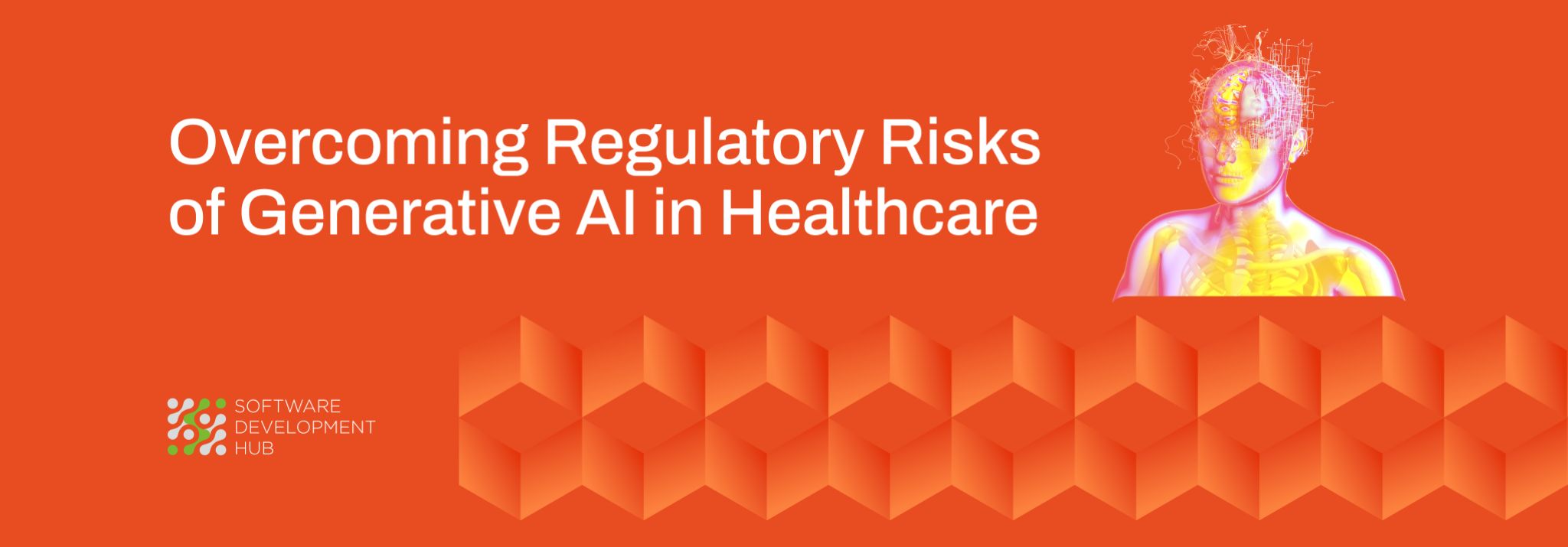Overcoming regulatory risks of generative AI in healthcare
A recent report from McKinsey & Company mentions the potential for up to $1 trillion in healthcare revenue through the use of artificial intelligence by 2030. While there are clear benefits in terms of improved service quality, reduced costs and increased efficiency, there are also risks. Read more about the challenges associated with AI in healthcare below in this article by BHH member Software Development Hub.
- Risks of Generative AI in Healthcare: Generative Artificial Intelligence (GenAI) has emerged as a revolutionary force in healthcare, promising innovative solutions to complex problems. However, like any powerful technology, GenAI in healthcare is not without its risks.
- Biased Outputs: One of the primary concerns surrounding Generative AI in healthcare is the potential for biased outputs. AI models are only as good as the data they are trained on, and if the training data is biased, the outputs will reflect those biases. In the context of healthcare, biased outputs could lead to inaccurate diagnoses or treatment recommendations, disproportionately affecting certain demographic groups.
- False Results: False results generated by AI in healthcare can have severe consequences. Whether it's misdiagnosing a condition or providing inaccurate prognoses, relying on false results can compromise patient care. Healthcare professionals must work closely with data scientists to continuously validate and improve AI models to minimize the occurrence of false results.
- Patient Privacy: The use of GenAI in healthcare raises significant concerns about patient privacy. As AI systems analyze sensitive health data, ensuring compliance with privacy regulations such as HIPAA is crucial. Unauthorized access, data breaches, or mishandling of patient information could not only lead to legal repercussions but also erode patient trust in healthcare institutions.
- Overreliance on AI: While AI can enhance medical decision-making, overreliance on AI poses its own set of risks. Healthcare professionals may become complacent or neglect critical thinking skills, assuming that the AI's recommendations are infallible. Striking the right balance between human expertise and AI assistance is essential to avoid overreliance pitfalls.
- Ethical Considerations: Ethical dilemmas arise as AI in healthcare becomes more prevalent. Questions about who is responsible for AI-generated decisions, how transparent AI algorithms should be, and whether patients should have the right to opt-out of AI-driven treatments need careful consideration.
- Regulatory and Legal Challenges: Navigating the regulatory landscape is a significant hurdle for businesses implementing GenAI in healthcare. Lack of clear regulatory frameworks can hinder the adoption of AI in healthcare, making it imperative to stay informed and proactive in addressing regulatory challenges.
These regulations and frameworks play a critical role in shaping how AI, including generative AI, is developed and used in Europe. They not only impact companies operating within Europe but also have a broader influence on global companies that engage with European markets, setting standards that often become benchmarks worldwide:
- GDPR (General Data Protection Regulation)
- AI Act (Artificial Intelligence Act)
- Digital Services Act (DSA)
- Digital Markets Act (DMA)
- Ethics Guidelines for Trustworthy AI
- The European Data Strategy
- The White Paper on Artificial Intelligence.
The focus on ethical, transparent, and safe AI development under these regulations can lead to more trust and acceptance of AI technologies globally.
Strategies for Mitigating the Risks of AI in Healthcare
- Addressing the risks associated with Generative AI in healthcare requires a multifaceted approach. Business analysts can play a pivotal role in implementing strategies to mitigate these risks effectively.
- To tackle biased outputs, ensure that AI models are trained on diverse and representative datasets. This reduces the risk of perpetuating existing biases and enhances the model's accuracy across different demographic groups.
- Implement robust mechanisms for continuous validation and improvement of AI models. Regularly update the models with new data and feedback from healthcare professionals to enhance their performance and minimize the occurrence of false results.
- Prioritize privacy by design. Work closely with legal experts to embed privacy safeguards into the AI system, ensuring compliance with healthcare data protection regulations. Implement encryption, access controls, and data anonymization to protect patient information.
- Emphasize the importance of human-AI collaboration. Encourage healthcare professionals to critically evaluate AI recommendations and provide a feedback loop for continuous improvement. This helps prevent overreliance on AI and maintains the human touch in patient care.
- Foster transparency and explainability in AI algorithms. Develop models that provide clear explanations for their decisions, enabling healthcare professionals to understand and trust the AI's outputs. This addresses ethical concerns and promotes accountability.
- Actively engage with stakeholders, including ethicists, healthcare professionals, and policymakers, in ethical discussions. Establish clear ethical guidelines and protocols for the responsible development and deployment of AI in healthcare.
- Stay informed about existing regulations and proactively address regulatory challenges. Collaborate with regulatory bodies to contribute insights and advocate for clear and adaptive frameworks that support the responsible use of AI in healthcare.
The integration of generative artificial intelligence into healthcare holds enormous promise, but careful consideration of the risks involved is paramount. All stakeholders must actively collaborate with technical experts, healthcare professionals, and regulators to implement strategies that mitigate risk while ensuring the ethical and responsible use of AI for the benefit of patients and the healthcare industry as a whole. Software Development Hub company helps in the environmentally friendly implementation of solutions based on AI technology. With up-to-date knowledge in the medtech field and extensive experience in application development, SDH’s spacialists provide the opportunity to increase the efficiency of the medical service provider while minimizing risks.


